The intersection of wolves’ dietary needs and the suitability of domestic dog food, including premium brands like Ollie, presents a fascinating topic that blends wildlife nutrition with domestic pet care practices.
The question at the heart of this exploration—”Can wolves eat dog food including Ollie?“—arises from a growing interest in the health and welfare of wolves, particularly those in captivity or living in close proximity to human environments.
This inquiry is not just about the feasibility of feeding dog food to wolves but also delves into the broader implications for their health and wellbeing.
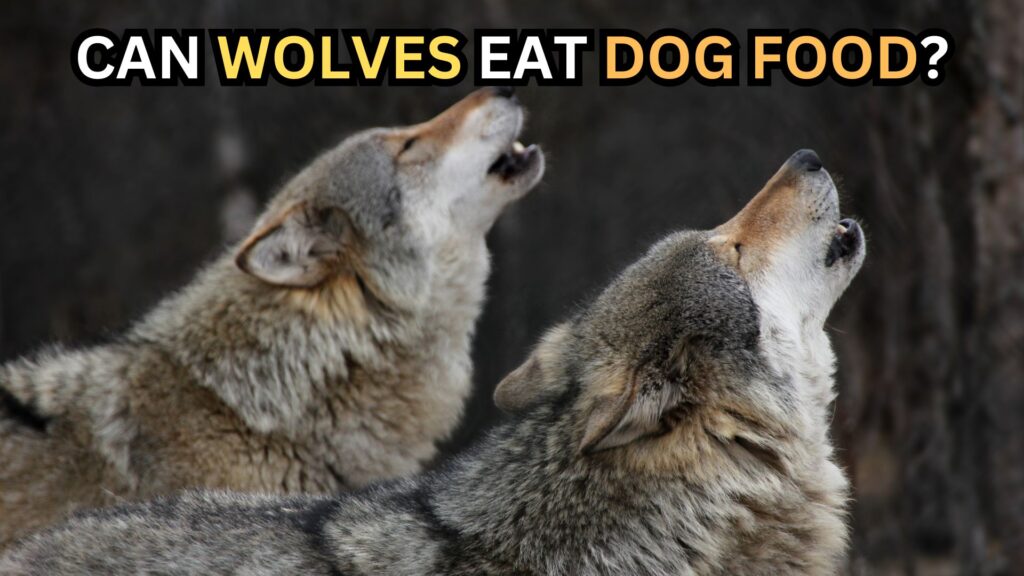
Wolves
Wolves, with their majestic presence and pivotal role in ecosystem balance, have dietary needs that are distinctly shaped by their life in the wild. In their natural habitat, wolves are apex predators, primarily feeding on a variety of prey including ungulates (like deer and elk) and smaller mammals, which provide them with a diet rich in protein, fat, and essential nutrients.
This diet is not only about sustenance but also about fulfilling specific nutritional needs that support their health, energy levels, and reproductive success.
Domestic Dogs
Contrastingly, domestic dogs have evolved alongside humans for thousands of years, leading to significant adjustments in their diet and nutrition.
Modern dog foods, including high-quality, human-grade options like Ollie, are formulated to cater to the nutritional needs of domestic dogs, which can vary significantly from those of their wild counterparts.
These products typically include a mix of proteins, carbohydrates, fats, vitamins, and minerals designed to meet the all-around nutritional standards set for domestic canine health.
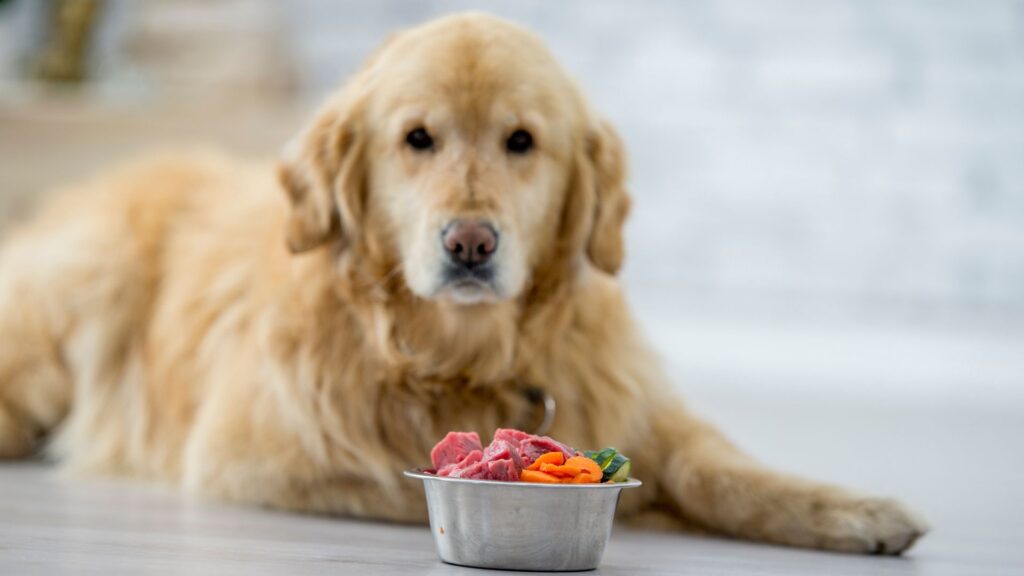
However, the nutritional adequacy of such dog foods for wolves is a subject of debate among wildlife experts and veterinarians. While premium dog food brands like Ollie offer high-quality ingredients that are superior to many other commercial options, the question remains whether they can meet the complex dietary requirements of wolves.
Wolves require a higher protein intake and different nutrient ratios than domestic dogs, reflecting their evolutionary dietary patterns. Moreover, the physical and digestive adaptations of wolves to their natural prey-based diet raise questions about the digestibility and nutritional efficacy of domestic dog food for these wild animals.
Health Implications of Feeding Dog Food to Wolves
The consideration of domestic dog food, including brands like Ollie, as a dietary option for wolves necessitates a deep dive into the potential health implications.
While the convenience and nutritional balance of such foods are appealing, the physiological and nutritional needs of wolves are distinct from those of domestic dogs, leading to several potential health benefits and drawbacks.
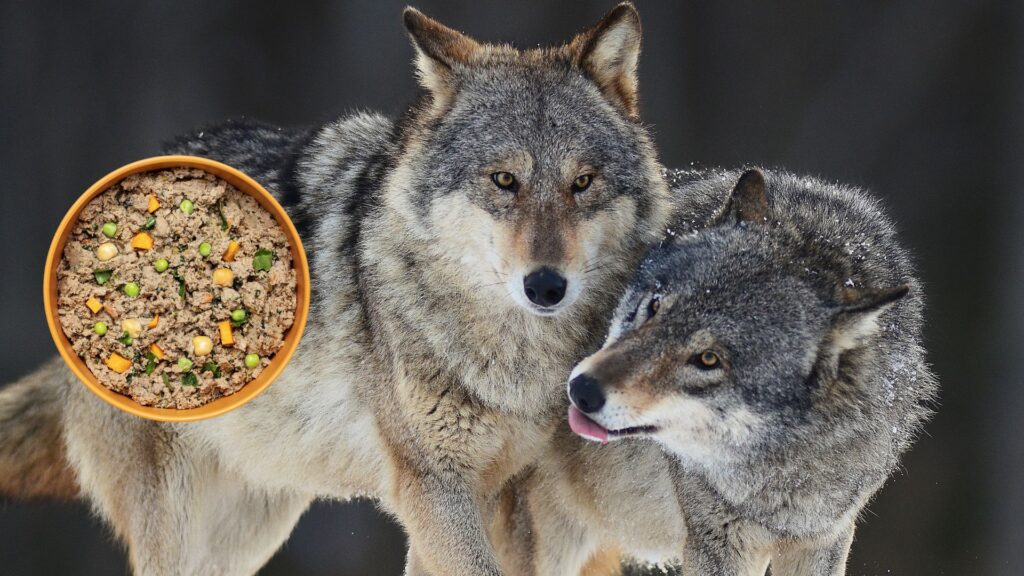
Potential Benefits and Drawbacks
One potential benefit of feeding high-quality dog food to wolves is the consistency and balance of nutrients it can offer, especially in controlled environments like sanctuaries where natural prey might not be abundantly available.
These foods are designed to be complete and balanced for carnivores under the assumption that their nutritional requirements are somewhat similar.
However, the drawbacks seem to overshadow the potential benefits. The primary concerns include obesity, nutrient deficiencies, or toxicities stemming from the fact that commercial dog foods are often tailored to the metabolic and activity levels of domestic dogs, which significantly differ from those of wild wolves.
Health Concerns
Specific health concerns associated with feeding dog food to wolves include:
- Obesity: Given their less active lifestyle in captivity, combined with the high carbohydrate content in many commercial dog foods, wolves are at risk of becoming overweight.
- Nutrient Deficiencies: Wolves have specific nutritional needs that may not be met by dog food, including higher requirements for protein and certain vitamins and minerals that are abundant in their natural prey diet.
- Toxicities: Some ingredients commonly found in dog foods may be harmful to wolves, especially those that are not part of their natural diet.
Despite these concerns, there is limited documented research on the direct health outcomes of wolves consuming commercial dog foods.
Most of the evidence is anecdotal or derived from observations within wildlife rehabilitation centers and sanctuaries, pointing towards a need for more comprehensive studies.
Feeding Practices for Wolves in Captivity
For wolves living in captivity or sanctuaries, feeding practices must be carefully designed to mimic their natural diet as closely as possible, with consideration for the unique nutritional profiles and physical health needs of these animals.
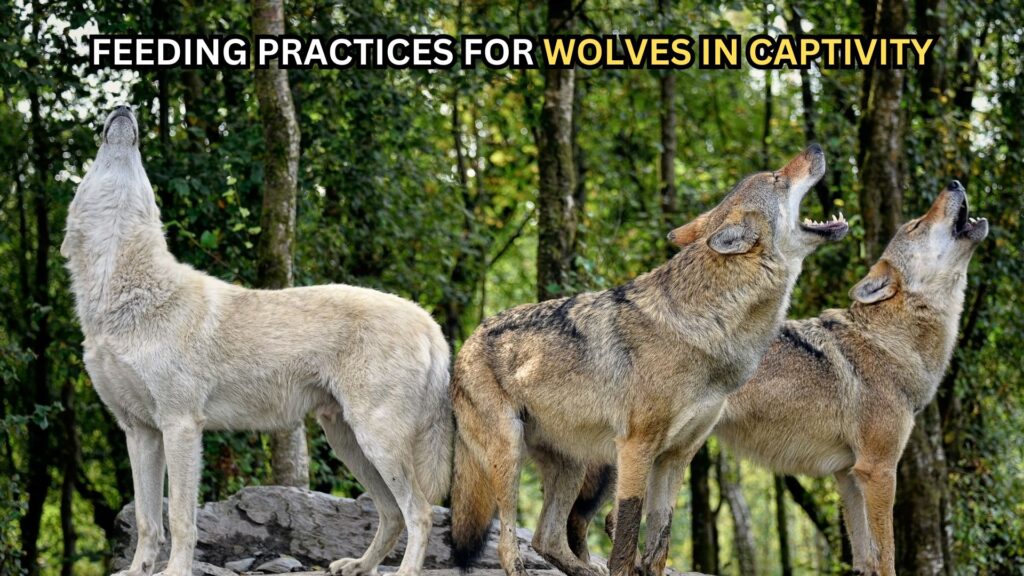
Guidelines for Safe Incorporation
If incorporating dog food into a wolf’s diet, it should be done cautiously and under the guidance of a veterinarian or a wildlife nutrition specialist.
Some guidelines include:
- Quality: Opt for high-quality, high-protein, low-carbohydrate dog foods that are closest to the macronutrient profile of wild prey.
- Supplementation: Consider supplementing dog food with raw meats, bones, and organs to provide the full spectrum of nutrients that wolves would receive from their natural diet.
- Monitoring: Regular health checks are essential to monitor the wolf’s weight, dental health, and overall wellbeing, adjusting the diet as necessary.
Alternatives to Dog Food
To more accurately meet the dietary needs of wolves in non-wild settings, alternatives to commercial dog food can include:
- Whole Prey: Feeding whole prey items, such as rabbits, rodents, or fish, can provide a more natural diet and help maintain dental health and physical condition.
- Raw Diet: A carefully planned raw diet that includes muscle meat, organs, and bones can mimic the nutritional content of wild prey.
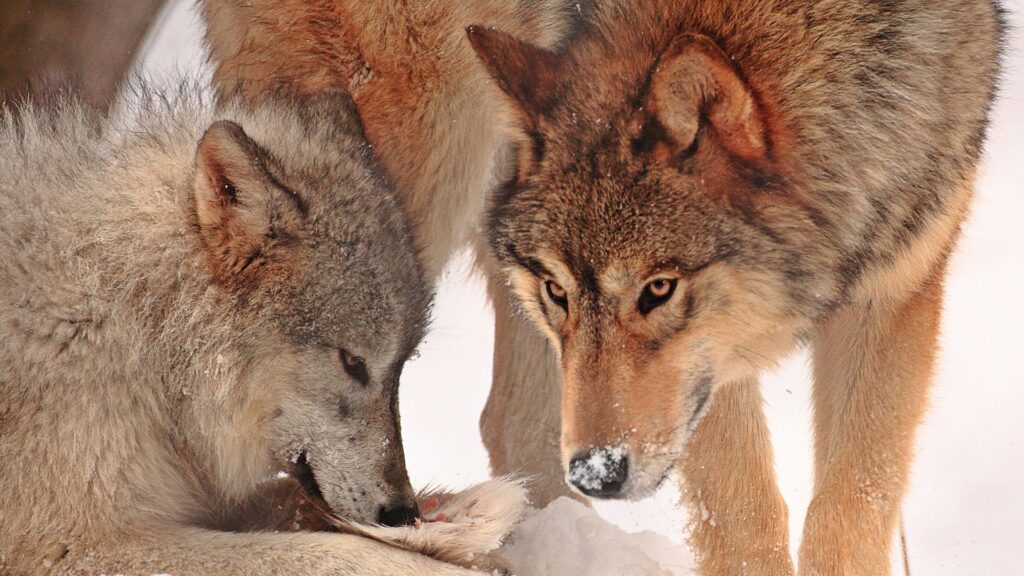
FAQs
Can wolves eat dog food without any health issues?
While wolves can physically consume dog food, it does not ideally meet their nutritional requirements and may lead to health issues like obesity or nutrient deficiencies over time. Consultation with wildlife nutrition experts is crucial.
How does dog food like Ollie compare to a wolf’s natural diet?
Dog food is formulated for domestic dogs and not for wild canids like wolves. It lacks the variety and nutritional profile of a wolf’s natural prey-based diet, especially in terms of protein content and the balance of certain nutrients.
This examination underscores the complexity of feeding wolves in captivity and the importance of striving for diets that respect their wild dietary needs. Through careful planning and expert consultation, it is possible to manage the dietary requirements of wolves in non-wild settings effectively.
What should be considered before feeding a wolf dog food?
Feeding a wolf dog food is a decision that should not be taken lightly.
Several key factors must be considered to ensure the health and wellbeing of the wolf:
- Nutritional Needs: Wolves have specific dietary requirements different from dogs, with a greater need for protein and certain nutrients found in their natural prey.
- Activity Level: Wolves in the wild cover large territories and are much more active than domestic dogs, affecting their calorie and nutrient requirements.
- Health Status: The age, health status, and specific needs of the individual wolf should guide dietary choices, with adjustments made for those with specific health concerns or conditions.
Are there any brands of dog food particularly suited or unsuited for wolves?
While no commercial dog food brand is specifically formulated for wolves, some high-protein, low-carb options are more suitable than others. Brands that prioritize high-quality, meat-based ingredients with minimal fillers and artificial additives are preferable.
However, it’s crucial to understand that even the best dog food may require supplementation to meet a wolf’s nutritional needs fully.
On the other hand, dog foods high in grains, fillers, and artificial ingredients are unsuited for wolves. These can lead to health issues such as obesity, diabetes, and nutritional deficiencies.
How can I ensure a balanced diet for a wolf in captivity?
Achieving a balanced diet for a wolf in captivity involves mimicking their natural diet as closely as possible. This can be accomplished through:
- Whole Prey and Raw Feeding: Incorporating whole prey items and a balanced raw diet can provide the nutritional complexity and variety a wolf needs.
- Supplementation: Supplementing with specific nutrients that may be lacking in a dog food-based diet is essential. This might include adding vitamins, minerals, or additional protein sources to the diet.
- Expert Consultation: Regularly consulting with wildlife nutrition experts or veterinarians specialized in carnivore diets is crucial for adjusting the diet based on the wolf’s health status and nutritional needs.
Conclusion
The exploration into whether wolves can eat dog food, including premium brands like Ollie, reveals a complex interplay between domestic canine nutrition and the unique requirements of wild canids. While high-quality dog food may serve as a part of a wolf’s diet in captivity, it cannot fully replicate the nutritional diversity and balance of a wild prey-based diet.
The health implications of substituting natural wolf diets with commercial dog food highlight the necessity for careful consideration, supplementation, and expert guidance.


